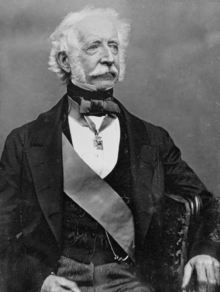Sir Hugh Gough
| The Viscount Gough | |
|---|---|

Daguerreotype of Gough wearing the Army Gold Cross, 1850
|
|
| Born |
3 November 1779 Woodstown, Annacotty, Ireland |
| Died | 2 March 1869 (aged 89) Booterstown, Ireland |
| Buried | Stillorgan, Ireland |
| Allegiance | United Kingdom |
| Service/branch | British Army |
| Years of service | 1794–1849 |
| Rank | Field Marshal |
| Commands held | Commander-in-Chief in China Commander-in-Chief in India |
| Battles/wars |
French Revolutionary Wars Peninsular War First Opium War Gwalior Campaign First Anglo-Sikh War Second Anglo-Sikh War |
| Awards |
Knight of the Order of St Patrick Knight Grand Cross of the Order of the Bath Knight Grand Commander of the Order of the Star of India Knight Bachelor Army Gold Cross |
Field Marshal Hugh Gough, 1st Viscount Gough, KP, GCB, GCSI, PC (3 November 1779 – 2 March 1869) was a British Army officer. After serving as a junior officer at the seizure of the Cape of Good Hope during the French Revolutionary Wars, Gough commanded the 2nd Battalion of the 87th (Royal Irish Fusiliers) Regiment of Foot during the Peninsular War. After serving as commander-in-chief of the British forces in China during the First Opium War, he became Commander-in-Chief, India and led the British forces in action against the Mahrattas defeating them decisively at the conclusion of the Gwalior Campaign and then commanded the troops that defeated the Sikhs during both the First Anglo-Sikh War and the Second Anglo-Sikh War for which he became known as the 'hammer of the Sikhs'.
Born the son of Lieutenant Colonel George Gough and Letitia Gough (née Bunbury), Gough was commissioned into the Limerick Militia on 7 August 1793. He transferred to a locally raised regiment on 7 August 1794 and, having been promoted to lieutenant in the 119th Regiment of Foot on 11 October 1794, transferred to the 78th (Highlanders) Regiment of Foot on 6 June 1795. He took part in the capture of the Cape of Good Hope in September 1795 during the French Revolutionary Wars and transferred to the 87th (Royal Irish Fusiliers) Regiment of Foot in December 1795, before being deployed with his regiment in the West Indies and taking part in the expedition to Dutch Guiana in 1799. After returning to England he was promoted to captain in the 2nd Battalion of his regiment on 25 June 1803 and to major in the same battalion on 25 June 1803.
...
Wikipedia
